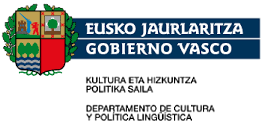Dokumentuaren akzioak
Basque in Elko: Preserving traditions, culture, and heritage

Elko, NV - Ana Maria Arrbillaga and her granddaughter Tabitha live in Elko, Nevada, but have unique roots in the Basque Country of Spain. Ana Maria was born in the Spanish Basque Country near Guernica, and moved to the United States in 1960. She stayed in Santa Rosa, California for a year and then moved to Elko, Nevada, where she has been ever since.
Tabitha Arrbillaga runs the Elko Basque Dance club, where her grandmother taught Basque dancing for a very long time and still hand makes all of the costumes for the dancers. They both expressed how important to them it is that Basque culture stays alive in Elko as well as in their family, and one of the best ways to preserve this culture is through teaching Basque dancing.
Ana Maria still sews all of the costumes for the dancers that Tabitha teaches at the studio. Rooms of her home and even her basement are full of Basque dancing attire and her supplies to make all of it. Tabitha would like to soon take the work off of her grandmother and learn how to sew the costumes as well.
Although trying to preserve Basque culture in Elko, Ana Maria was not always able to embrace her culture, specifically during her childhood in the Basque country. Tabitha explained that what Hitler was doing to the Jewish population was very similar to what Fransisco Franco was attempting to do to the Basque population during her grandmother's childhood. Ana Maria recalled Hitler's bombing of Guernica in 1938. Her and her family had to take shelter in a church in the city along with many other Basque families.
Besides her work teaching Basque dancing, Ana Maria also started working at the Elko Basque Dinner House upon arriving in Elko, and was there through 42 years and two different owners. This dinner house is now an Italian restaurant, but Elko still embraces Basque dining with a few other restaurants in the area.
When asked about the importance of keeping Basque culture alive in Elko, both Ana Maria and Tabitha agreed that it is not just for their family but for the Basque culture to not be lost. Tabitha explained that Basque is one of the oldest languages and cannot even be completely traced back to its origin and it is impressive that it is still spoken today. She hopes to preserve her family history and the Basque culture through teaching Basque dancing and incorporating the language and culture along with it.
Dokumentuaren akzioak






